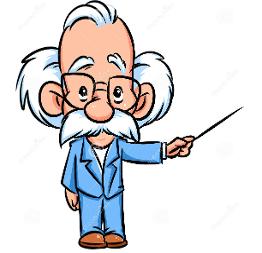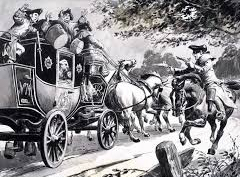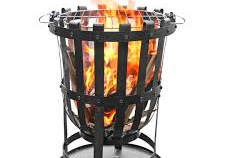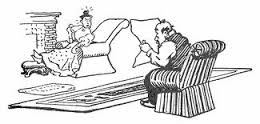This is a moment when the lay reader must rely on the scholars for explanation. Much turns on the meaning of the word 'saved'. Langland has a concept of 'saved in waiting' which contains good men who are waiting in Limbo for an actual salvation still to come. So when The Dreamer meets Abraham (Faith) and Moses (Hope) they appear to offer rather different messages,
The Dreamer sees conflict between them. Abraham knows a lot about God, and faith like his allows entry to the waiting room with the promise, some day, of heaven. What more could anybody want? Then Moses presents Christ's summary of the commandments - 'Love God and love your neighbour'- as an ordinance, not yet signed into law, that will by-pass Limbo. Moses (Spes) in the text) is searching for the person who will sign and seal this document. The Christian interpretation of all this is that Christ, by his death and resurrection, will gain the authority to sign this dispensation into law.
The Dreamer thinks that loving God (one person despite the trinity concept) is easier than than loving two (God and the neighbour) because some neighbours might be evil men or enemies. So there are lines where a logical connection is otherwise unclear.
"One who steps with one staff seems in better health Than he who steps with two, it seems to all our eyes."
"'Go your way!' said I to Spes, 'so God help me, Those that learn your law will not long follow it'".
It is a discussion more than a confrontation, and they journey on together till they meet a Samaritan, and some of the Good Samaritan story is re-told as in the bible. But there is a special twist in that Faith and Hope are the two who turn aside from the injured man. The Dreamer follows after the Samaritan and talks about the poor behaviour of Faith and Hope. The Samaritan tells him that they were not to be blamed because there was nothing much they could have done. The human experience, he says, is such that;
"No one in this world went through that wilderness Unrobbed and unrifled, riding or walking, Except myself and Faith and Spes, his fellow."
The journey is never going to be safe until after the birth and death and resurrection of Christ. When excusing Faith and Hope, Charity (the Samaritan), says;
"No medecine may heal that man of his afflictions, Neither Faith nor fair Hope, his wounds so fester, Without the blood of a babe born of a maiden."
The Dreamer returns to the differences he perceives between Faith and Hope. Charity tells him to believe them both and then delivers a long speech about the Trinity. The connection is not made clear, but can be imagined as a comparison between two distinct three-in-one concepts. So Faith, Hope and Charity are linked in a manner similar to Father, Son and Holy Ghost. Each one is an aspect of the unity and may be described in different terms from the others without destroying that unity. Langland gives the greatest number of lines to The Holy Ghost, possibly because he sees Charity as the outcome of the others.
It is a tough passage, and the effort of finding sense in it can cause the reader to overlook some of the fine images, often from daily life, which describe what The Holy Ghost can do. One of the best is;
"As the glowing coal gladdens not the workmen
Who wake to work on winter evenings,
So much as hemlock or taper that catch fire to blaze,
No more do Sire and Son and Holy Spirit together
Grant and grace or forgiveness for our offences
Till the Holy Ghost begin to glow and flicker.
But the Holy Ghost glows as a coal only
Till loyal love blows upon him.
Then he flares into a fire upon Father and Filius
And melts their Might into Mercy, as men see in winter
How icicles on the eaves in the heat of sunshine
Melt in a moment to mist and water."
There are many lines describing the activity of the Holy Ghost, the dominant theme being that the HG plays an 'awakening' role to make people aware of the need for repentance and restitution. But without his help a person will be damned.
"So it fares with the folk who are false in their lifetime, Who live evilly and never slacken till life is over. Then dread and despair drive grace from them, And mercy may not fall upon their minds in dying."
Langland's theology here seems to be that a death-bed confession plus real repentance will get you into heaven because of God's mercy.
"Not that God has no power or that he is not ab
To amend all that is amiss, or his mercy not greater
Than all our wicked works."
But not everyone is inspired by the HG to think this way at the end of life, or perhaps they reject the offer. There is also a postscript that covers Langland's views about 'rede quod debes'.
"But some restitution is needed before righteousness becomes merciful;
Sorrow is satisfaction for him who can pay nothing."
Needing an image to illustrate things that can and can't be forgiven, Langland offers one of his splendid picture of human misfortune.
"There are three things that make man forcefully
To flee from his own house, as Holywrit shows us,
One is a wicked wife who will not be chastened;
Her man flees from her for fear of her revilings.
If his house become uncovered and it rain on his pallet
He seeks and seeks till he can sleep dry.
And when smoke and smother strike his eyesight,
It is worse than his wife or a wet blanket."
At the end of all this complicate theology the Samaritan makes a typically abrupt VPP exit. Saying, 'I may delay no longer' and pricking his charger
"...went away like the wind, and with that I awoke."
SCHOLAR NEEDED TO EXPLAIN TEXT

ONE STICK ONLY - LESS DISABLED
UNROBBED AND UNRIFLED? NOT THIS LOT

THE CONCEPT OF THE TRINITY

GLADDENS THE WORKMAN

ICICLES ON THE EAVES

A WICKED WIFE WHO WILL NOT BE CHASTENED

IT RAINS OH HIS PALLET
Click HOME to go back to the beginning or click CRUCIFIXION to move the story on.